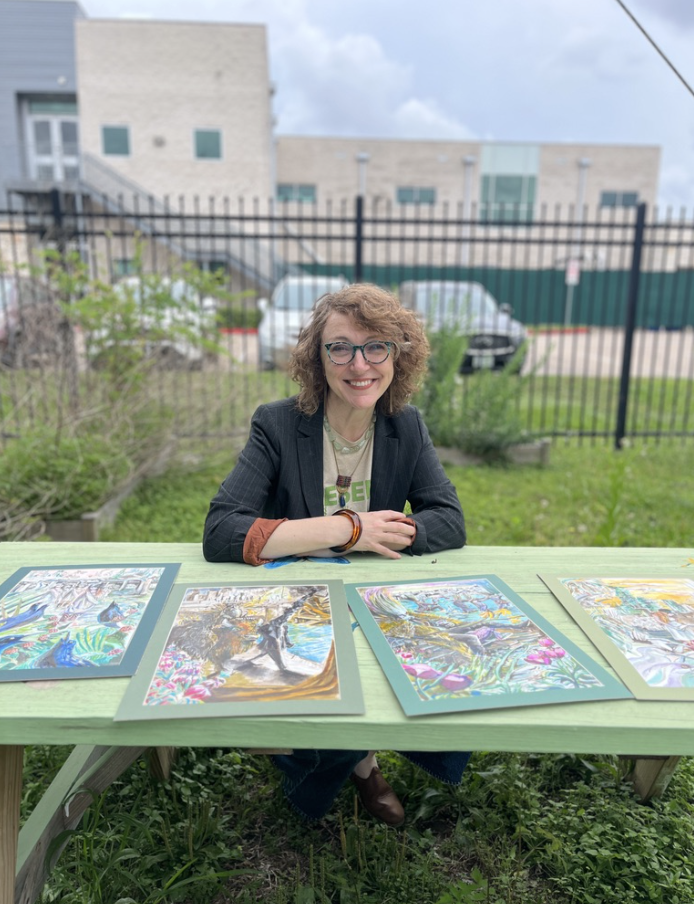
Noah Pacht, Emery Class of 2020, found his place amongst the glitz and glamor of Broadway. This year, Pacht made his Broadway debut, acting as an understudy in “John Proctor Is the Villain,” a play with a modern twist on “The Crucible.” (Fun fact, as of now, the play stars Sadie Sink, who, famous today for her role in “Stranger Things,” once graced Houston’s very own Hobby Center stage in a Theater Under the Stars production of “Annie.”)
Before joining the “John Proctor Is the Villain” cast, Pacht’s career included appearing in Billy Porter’s directorial debut, a movie entitled “Anything’s Possible,” an Off-Broadway debut last fall in “The Merchant of Venice,” and numerous other productions amidst his high school and undergraduate stints. But now on Broadway, Pacht notes how simply magical it is to “[walk] through Times Square to get to the theater everyday” and just “[be] in a Broadway theater.”
And Pacht’s debut is not one to be thought of lightly. In the midst of Tony season, “John Proctor Is the Villain” emerged with seven nominations, including Best New Play, Best Direction of a Play, and Best Leading Actress in a Play. “John Proctor Is the Villain” is one of this season’s most Tony-nominated plays, and Pacht is getting to learn “the ins and outs of … Tony season.” Pacht noted the surreality of the experience, saying, “For any theater kid, it’s super exciting just to be even anywhere close to it.” He says, “Even today, one of the actors in our cast, who’s Tony-nominated, she’s … doing like an Instagram takeover … for the Tony Awards Instagram, so even that’s just fun.” For Pacht, his experience with award season has proven to him just how “far-reaching [the Tonys] are… [and] how many people grew up watching the Tonys and following all that stuff, myself included.”
Today, Pacht acknowledges how the various experiences he has had and lessons he has learned have helped him make it to where he is now. Pacht’s theater experience at Emery, appearing in shows like “Romeo and Juliet,” “Bright Star,” and “It Shoulda Been You,” helped shape him into the performer he is today. He believes Emery director Jennifer Bauer-Conley (JBC) has “a great eye for potential and resilience.” At times when Pacht felt things came less naturally to him, JBC never “allowed [him] to harp on that or get in [his] head … and let that weigh [him] down.” In high school, Pacht learned “to overcome any challenges as they came” and to realize that the things he might “not [be] good at, [he] can get good at with enough work and resilience.” He believes JBC “really helped instill that belief in [him].”
Following Emery, Pacht continued his study at Carnegie Mellon, which he graduated from last year with a BFA in Drama, learning from seasoned professors and peers. Pacht recalls a time when one lesson about “different techniques and how to approach acting … wasn’t clicking for [his] friend … so [they] went after class to talk to [their] teacher about it.” Pacht felt like he “[needed] to make it work because that’s what you’re supposed to do.” However, his professor, Tony McKay said, “Technique is for when your intuition fails you.” That stuck with Pacht. He believes in artistic and creative fields, it can be “easy to overthink and … be like ‘oh, there’s a right way to do this because that’s how people before me have done it,’ but … in reality … you need to trust your intuition and your own instinct a little bit more and then, when you get stuck, fall back on technique.”
Now, even on Broadway, Pacht is still learning. Danya Tamor, director of “John Proctor Is the Villain,” has proven a huge inspiration. Pacht is truly inspired by the way Tamor treats and views theater: “Getting to watch how [Tamor] leads a room and works with actors has been really eye-opening … It feels almost as though she’s treating theater as a religious or spiritual experience.” She has “specific tradition and customs” that lead her in how she approaches rehearsals, such as group warm ups and check-ins at the start of rehearsals. Pacht notes that sometimes in these check-ins, they “share … personal stories of times in [their] lives that [they] felt connected to … some of the things that the characters in this play, for example, are going through,” and it allows the cast to “bond and come together … [to] talk about the play.” It is important, Pacht believes, to “[start] every single rehearsal on that kind of same page,” creating “the mindset of ‘we are doing something meaningful for ourselves and other people.’” Seeing how “sacred” Tamor’s work is to her “is really … inspiring” to Pacht because “when you have a director that’s that committed to it, it allows the actors to be just as committed as well.”
Pacht is one of Emery’s many success stories, finding himself within a world of emerging plays and star-studded casts. Yet, he says, “I think especially in our community, like sort of the Emery bubble and Houston … it is kind of … rare that someone feels really comfortable and encouraged to … go down a super artistic, creative path. I think we come from a place where people are looking for … more traditional … or dependable jobs.” And while Pacht acknowledges that pursuing careers in the arts can often be “a precarious life path,” he believes if it’s “something you love and it’s something you’re willing to work for, it’s worth it, even if you don’t see a ton of people around you doing it.” If you love the arts and hope to make a career out of it, Pacht urges you to “just go all in.”
UPDATED 6/29/25:

Photo: @emerytheatrefamily
Pacht officially took his first Broadway bow! In the June 15 performance of “John Proctor Is the Villain,” Pacht played the role of Lee Turner. Bauer-Conley was lucky enough to attend, alongside Noah’s family, friends, and other Emery alumni. She says the “Emery showing was just massive,” noting it as a “testament to what we mean when we talk about the Emery Theater Family … it really, truly is a lifelong family.” Bauer-Conley also mentioned the support that poured in from those unable to cheer Noah on in person. She said, “Even those who couldn’t make it to New York were sending me words of encouragement to pass along, or FaceTiming in to send love.”

Photo: @emerytheatrefamily
But above all else, Bauer-Conley believes the outpouring of love was a “tribute to what an incredible person Noah is and the kind of legacy he’s already built for himself.” She calls him “the kindest, most hard-working person,” saying he always “takes care of and supports other people.” She believes it is because of that legacy and his character that “all the people there for him that day — Emery alum, college friends, family, even his agents and managers — were so emotional getting to watch him reach this astounding milestone.” At the end of the show, she recalls “[sobbing] in a giant hug … in the theatre” with Emery alumni, unable to hold back their emotions, despite getting some “really amazing looks from other audience members.”
She calls his performance “absolutely incredible, truly beyond words.” Though beyond his beautiful acting, she also says, “it was also just one of those moments where it felt like all was right in the world — when good things happen to good people.”
“He couldn’t deserve this more,” Bauer-Conley says. “He’s worked so hard for it, and I can’t wait to see what’s next. I’ll be front row.”

Photo: @emerytheatrefamily






